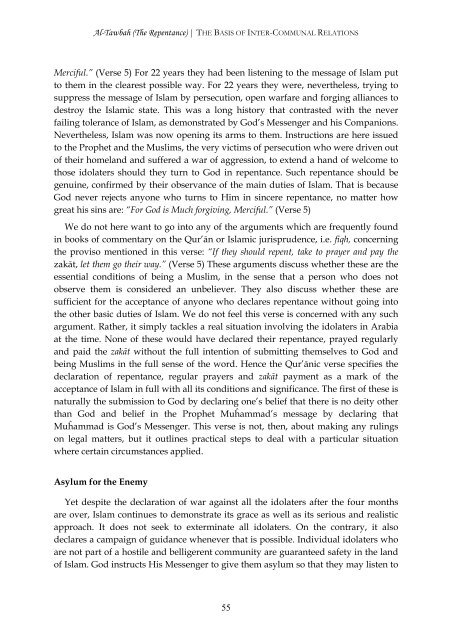Volume 8 Surah 9 - Enjoy Islam
Volume 8 Surah 9 - Enjoy Islam
Volume 8 Surah 9 - Enjoy Islam
- No tags were found...
Create successful ePaper yourself
Turn your PDF publications into a flip-book with our unique Google optimized e-Paper software.
Al-Tawbah (The Repentance) | THE BASIS OF INTER-COMMUNAL RELATIONSMerciful.” (Verse 5) For 22 years they had been listening to the message of <strong>Islam</strong> putto them in the clearest possible way. For 22 years they were, nevertheless, trying tosuppress the message of <strong>Islam</strong> by persecution, open warfare and forging alliances todestroy the <strong>Islam</strong>ic state. This was a long history that contrasted with the neverfailing tolerance of <strong>Islam</strong>, as demonstrated by God’s Messenger and his Companions.Nevertheless, <strong>Islam</strong> was now opening its arms to them. Instructions are here issuedto the Prophet and the Muslims, the very victims of persecution who were driven outof their homeland and suffered a war of aggression, to extend a hand of welcome tothose idolaters should they turn to God in repentance. Such repentance should begenuine, confirmed by their observance of the main duties of <strong>Islam</strong>. That is becauseGod never rejects anyone who turns to Him in sincere repentance, no matter howgreat his sins are: “For God is Much forgiving, Merciful.” (Verse 5)We do not here want to go into any of the arguments which are frequently foundin books of commentary on the Qur’ān or <strong>Islam</strong>ic jurisprudence, i.e. fiqh, concerningthe proviso mentioned in this verse: “If they should repent, take to prayer and pay thezakāt, let them go their way.” (Verse 5) These arguments discuss whether these are theessential conditions of being a Muslim, in the sense that a person who does notobserve them is considered an unbeliever. They also discuss whether these aresufficient for the acceptance of anyone who declares repentance without going intothe other basic duties of <strong>Islam</strong>. We do not feel this verse is concerned with any suchargument. Rather, it simply tackles a real situation involving the idolaters in Arabiaat the time. None of these would have declared their repentance, prayed regularlyand paid the zakāt without the full intention of submitting themselves to God andbeing Muslims in the full sense of the word. Hence the Qur’ānic verse specifies thedeclaration of repentance, regular prayers and zakāt payment as a mark of theacceptance of <strong>Islam</strong> in full with all its conditions and significance. The first of these isnaturally the submission to God by declaring one’s belief that there is no deity otherthan God and belief in the Prophet Muĥammad’s message by declaring thatMuĥammad is God’s Messenger. This verse is not, then, about making any rulingson legal matters, but it outlines practical steps to deal with a particular situationwhere certain circumstances applied.Asylum for the EnemyYet despite the declaration of war against all the idolaters after the four monthsare over, <strong>Islam</strong> continues to demonstrate its grace as well as its serious and realisticapproach. It does not seek to exterminate all idolaters. On the contrary, it alsodeclares a campaign of guidance whenever that is possible. Individual idolaters whoare not part of a hostile and belligerent community are guaranteed safety in the landof <strong>Islam</strong>. God instructs His Messenger to give them asylum so that they may listen to55
















